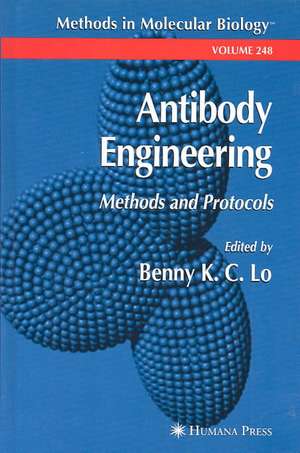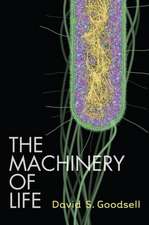Antibody Engineering: Methods and Protocols: Methods in Molecular Biology, cartea 248
Editat de Benny K. C. Loen Limba Engleză Hardback – 5 dec 2003
| Toate formatele și edițiile | Preț | Express |
|---|---|---|
| Paperback (1) | 953.65 lei 6-8 săpt. | |
| Humana Press Inc. – 10 noi 2010 | 953.65 lei 6-8 săpt. | |
| Hardback (1) | 961.10 lei 6-8 săpt. | |
| Humana Press Inc. – 5 dec 2003 | 961.10 lei 6-8 săpt. |
Din seria Methods in Molecular Biology
- 9%
 Preț: 791.63 lei
Preț: 791.63 lei - 23%
 Preț: 598.58 lei
Preț: 598.58 lei - 20%
 Preț: 882.98 lei
Preț: 882.98 lei -
 Preț: 252.05 lei
Preț: 252.05 lei - 5%
 Preț: 802.70 lei
Preț: 802.70 lei - 5%
 Preț: 729.61 lei
Preț: 729.61 lei - 5%
 Preț: 731.43 lei
Preț: 731.43 lei - 5%
 Preț: 741.30 lei
Preț: 741.30 lei - 5%
 Preț: 747.16 lei
Preț: 747.16 lei - 15%
 Preț: 663.45 lei
Preț: 663.45 lei - 18%
 Preț: 1025.34 lei
Preț: 1025.34 lei - 5%
 Preț: 734.57 lei
Preț: 734.57 lei - 18%
 Preț: 914.20 lei
Preț: 914.20 lei - 15%
 Preț: 664.61 lei
Preț: 664.61 lei - 15%
 Preț: 654.12 lei
Preț: 654.12 lei - 18%
 Preț: 1414.74 lei
Preț: 1414.74 lei - 5%
 Preț: 742.60 lei
Preț: 742.60 lei - 20%
 Preț: 821.65 lei
Preț: 821.65 lei - 18%
 Preț: 972.30 lei
Preț: 972.30 lei - 15%
 Preț: 660.49 lei
Preț: 660.49 lei - 5%
 Preț: 738.41 lei
Preț: 738.41 lei - 18%
 Preț: 984.92 lei
Preț: 984.92 lei - 5%
 Preț: 733.29 lei
Preț: 733.29 lei -
 Preț: 392.60 lei
Preț: 392.60 lei - 5%
 Preț: 746.26 lei
Preț: 746.26 lei - 18%
 Preț: 962.66 lei
Preț: 962.66 lei - 23%
 Preț: 860.22 lei
Preț: 860.22 lei - 15%
 Preț: 652.64 lei
Preț: 652.64 lei - 5%
 Preț: 1055.50 lei
Preț: 1055.50 lei - 23%
 Preț: 883.87 lei
Preț: 883.87 lei - 19%
 Preț: 491.89 lei
Preț: 491.89 lei - 5%
 Preț: 1038.86 lei
Preț: 1038.86 lei - 5%
 Preț: 524.16 lei
Preț: 524.16 lei - 18%
 Preț: 2122.34 lei
Preț: 2122.34 lei - 5%
 Preț: 1299.23 lei
Preț: 1299.23 lei - 5%
 Preț: 1339.12 lei
Preț: 1339.12 lei - 18%
 Preț: 1390.26 lei
Preț: 1390.26 lei - 18%
 Preț: 1395.63 lei
Preț: 1395.63 lei - 18%
 Preț: 1129.65 lei
Preț: 1129.65 lei - 18%
 Preț: 1408.26 lei
Preț: 1408.26 lei - 18%
 Preț: 1124.92 lei
Preț: 1124.92 lei - 18%
 Preț: 966.27 lei
Preț: 966.27 lei - 5%
 Preț: 1299.99 lei
Preț: 1299.99 lei - 5%
 Preț: 1108.51 lei
Preț: 1108.51 lei - 5%
 Preț: 983.76 lei
Preț: 983.76 lei - 5%
 Preț: 728.16 lei
Preț: 728.16 lei - 18%
 Preț: 1118.62 lei
Preț: 1118.62 lei - 18%
 Preț: 955.25 lei
Preț: 955.25 lei - 5%
 Preț: 1035.62 lei
Preț: 1035.62 lei - 18%
 Preț: 1400.35 lei
Preț: 1400.35 lei
Preț: 961.10 lei
Preț vechi: 1172.06 lei
-18% Nou
Puncte Express: 1442
Preț estimativ în valută:
183.93€ • 191.32$ • 151.84£
183.93€ • 191.32$ • 151.84£
Carte tipărită la comandă
Livrare economică 14-28 aprilie
Preluare comenzi: 021 569.72.76
Specificații
ISBN-13: 9781588290922
ISBN-10: 1588290921
Pagini: 576
Ilustrații: XIV, 562 p.
Greutate: 0.89 kg
Ediția:2004
Editura: Humana Press Inc.
Colecția Humana
Seria Methods in Molecular Biology
Locul publicării:Totowa, NJ, United States
ISBN-10: 1588290921
Pagini: 576
Ilustrații: XIV, 562 p.
Greutate: 0.89 kg
Ediția:2004
Editura: Humana Press Inc.
Colecția Humana
Seria Methods in Molecular Biology
Locul publicării:Totowa, NJ, United States
Public țintă
ResearchCuprins
Antibody Sequence And Structure.- Internet Resources for the Antibody Engineer.- The Kabat Database and a Bioinformatics Example.- IMGT, The International ImMunoGeneTics Information System®, http://imgt.cines.fr.- Antibody Variable Regions.- Studying Antibody Conformations by Ultracentrifugation and Hydrodynamic Modeling.- Antibody-Lead Generation.- PCR Cloning of Human Immunoglobulin Genes.- Antibody Humanization by CDR Grafting.- Selection of Human Antibodies from Phage Display Libraries.- Production of Human Single-Chain Antibodies by Ribosome Display.- Production of Human Antibodies from Transgenic Mice.- Selection of Internalizing Antibodies for Drug Delivery.- Engineering Multivalent Antibody Fragments for In Vivo Targeting.- Production of Recombinant Bispecific Antibodies.- Antibody Expression And Optimization.- Expression and Isolation of Recombinant Antibody Fragments in E. coli.- Expression of Recombinant Antibodies in Mammalian Cell Lines.- Human Antibody Production Using Insect-Cell Expression Systems.- Antibody Production in Transgenic Plants.- Directed Mutagenesis of Antibody Variable Domains.- Antibody Affinity Maturation by Chain Shuffling.- Antibody Affinity Maturation by Random Mutagenesis.- Developing a Minimally Immunogenic Humanized Antibody by SDR Grafting.- Antibody Characterization and Novel Applications.- Antibody Purification by Column Chromatography.- Affinity Measurement Using Surface Plasmon Resonance.- Kinetic Exclusion Assays to Study High-Affinity Binding Interactions in Homogeneous Solutions.- Characterization of Antibody-Antigen Interactions by Fluorescence Spectroscopy.- Antibody Epitope Mapping Using Arrays of Synthetic Peptides.- Mapping Antibody:Antigen Interactions by Mass Spectrometry and Bioinformatics.- Radiometal Labeling ofAntibodies and Antibody Fragments for Imaging and Therapy.- Production and Characterization of Anti-Cocaine Catalytic Antibodies.- Recombinant Immunotoxins in the Treatment of Cancer.- Antibodies in Proteomics.- Targeting of Antibodies Using Aptamers.
Recenzii
"...as the book provides as comprehensive collection of clear, detailed methods it is very likely to prove its worth as a laboratory reference." - Immunology News
"...a valuable addition to in-lab books" - Microbiology Today
"...a valuable addition to in-lab books" - Microbiology Today
Textul de pe ultima copertă
With 10 recent FDA approvals of therapeutic antibody drugs and hundreds more in the biotechnology pipeline, it is clear that engineered antibodies will play a major role in treating human diseases in the 21st century. In Antibody Engineering: Methods and Protocols, leading researchers and clinicians present a core collection of cutting-edge techniques for the generation, expression, optimization, and characterization of recombinant antibodies. Readily reproducible protocols for lead generation range from the cloning of human immunoglobulin genes to the generation of human recombinant antibodies by humanization approaches, molecular display technologies, and transgenic animals. The techniques for antibody expression and optimization utilize not only bacterial and mammalian cell cultures, but also insect cell cultures and transgenic plants. State-of-the-art technologies are described for the characterization of antigen-binding affinity and specificity with novel applications in radioimmunotargeting, cancer immunotherapy, drug abuse, and proteomics. Each fully tested protocol is described in step-by-step detail and includes background material, equipment and reagent lists, and tips on troubleshooting and avoiding pitfalls.
Comprehensive and up-to-date, Antibody Engineering: Methods and Protocols provides both laboratory and clinical investigators with a diverse array of the fundamental techniques upon which new and imaginative drug technologies can be successfully developed.
Comprehensive and up-to-date, Antibody Engineering: Methods and Protocols provides both laboratory and clinical investigators with a diverse array of the fundamental techniques upon which new and imaginative drug technologies can be successfully developed.
Caracteristici
Includes supplementary material: sn.pub/extras







